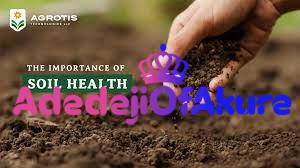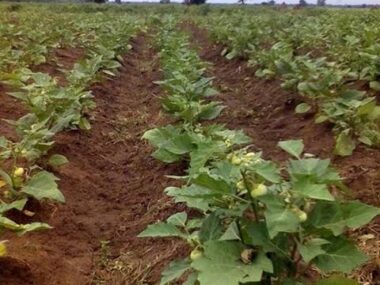Introduction:
Soil health is the cornerstone of successful farming practices, yet it’s often overlooked or underestimated. Beneath our feet lies a complex ecosystem teeming

with life, nutrients, and microorganisms crucial for sustaining agriculture. In this article, we delve into the significance of soil health and how it directly impacts the success and sustainability of farming endeavors.
The Importance of Soil Health:
- Nutrient Availability: Healthy soil serves as a reservoir of essential nutrients necessary for plant growth. Nitrogen, phosphorus, potassium, and a myriad of micronutrients are naturally present in fertile soil. However, soil health determines the availability and accessibility of these nutrients to plants. Soil organisms, such as bacteria and fungi, play a vital role in breaking down organic matter and releasing nutrients in forms that plants can absorb.
- Water Retention and Drainage: Soil structure influences its ability to retain water and allow for proper drainage. Healthy soil with good structure and organic matter content can hold moisture effectively during dry periods, reducing the need for irrigation. Conversely, well-draining soil prevents waterlogging, which can suffocate plant roots and lead to crop loss. Maintaining soil health ensures optimal water balance, crucial for crop productivity and resilience to drought or excessive rainfall.
- Soil Fertility and Productivity: Fertile soil is the foundation of high-yield agriculture. Soil health directly correlates with its fertility, which determines its capacity to support vigorous plant growth and abundant harvests. Healthy soils foster robust root systems, enabling plants to access nutrients and water efficiently. Furthermore, balanced soil pH levels contribute to optimal nutrient uptake and minimize the risk of nutrient deficiencies or toxicities, enhancing overall crop productivity.
- Erosion Prevention: Soil erosion poses a significant threat to agricultural sustainability and environmental conservation. Healthy soil with sufficient organic matter and strong structure is more resistant to erosion caused by wind or water. Soil organisms, such as earthworms and microbial communities, contribute to soil stability by binding particles together and creating aggregates. Implementing soil conservation practices, such as cover cropping and contour plowing, preserves soil health and mitigates erosion risks.
- Carbon Sequestration and Climate Resilience: Healthy soils act as carbon sinks, sequestering atmospheric carbon dioxide and mitigating climate change. Organic matter decomposition by soil microbes converts carbon into stable soil organic carbon, contributing to long-term soil fertility and resilience. Improving soil health through regenerative agricultural practices, such as no-till farming and agroforestry, enhances carbon sequestration potential and promotes climate-smart agriculture.
Conclusion:
In conclusion, soil health is paramount for the success, sustainability, and resilience of farming systems worldwide. Recognizing the intricate relationship between soil health and agricultural productivity is essential for informed decision-making and responsible land stewardship. By prioritizing soil conservation, promoting organic farming practices, and embracing regenerative agriculture, farmers can safeguard soil health for future generations while ensuring food security and environmental sustainability. Let us cultivate not only crops but also the health of our soils, nurturing the foundation of thriving ecosystems and vibrant agricultural communities.










